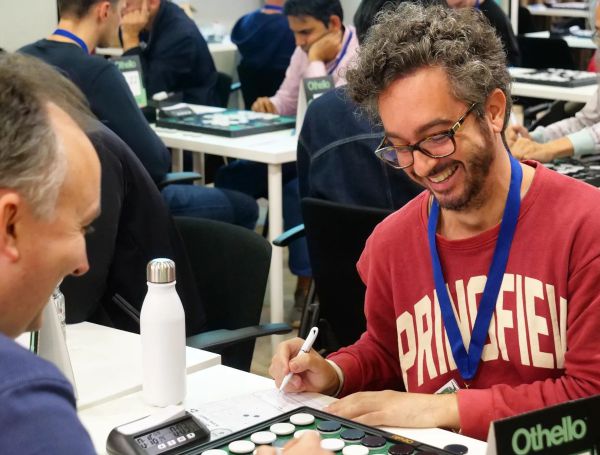Othello news
Who's afraid of blunders?
6 January 2024Written by Carlo Affatigato

Playing Othello can be a very frustrating experience. Although the rules are easy to learn, you spend so much time improving your strategy. Years passed studying, acquiring knowledge, learning patterns, and getting confident with traps. Then, you refine your style; you work on your weaknesses, practice on the board, and join tournaments. You absorb suggestions from experienced players, and you build your self-esteem. Finally, typically after many years, you trust yourself and sit in front of the board in some important competitions, ready to prove your value against other good players. You have a plan, you are focused, you developed your openings, and you may know where to bring the match from the beginning to the end.
And then you blunder.
In Othello, blunders are typically mistakes you notice one second after you make them. That's what really annoys you: until a moment before, you spent minutes evaluating two or three different moves, all looking pretty similar. You assess pros and cons; you make an effort to visualize how the board will look like afterward and what your opponent will play later. Then you make your decision, you play your move, and you immediately look at the mess you made. Maybe you didn't realize you would flip crucial discs that change the situation entirely, or you didn't notice the easy answer your opponent will play, changing the fate of your game.
The most infuriating side of blunders is that they are entirely avoidable. In most cases, your knowledge is more than enough to understand why they are a mistake. If you were your opponent, you would know very clearly what to do, and if you saw the resulting situation one second earlier, you could write an essay explaining in detail why that's a blunder.
Still, you make them. Even after years of experience, even if you have seen that pattern or position many times in the past, you still blunder. And you wonder when this curse will end. When will you clearly visualize the board after the move you are evaluating? When will you be able to avoid such easy wins for your opponent?
Never.
The truth is that it will always happen. Whether you just started playing Othello or have decades of experience, whether you are an average player or one of the top representatives of your country, you'll never get rid of blunders completely. Of course, the more you play, the less frequently they happen, and blunders happen far less often if you are focused and have no time pressure. But trust us: it will always happen, and it still happens to top players at every level. I can clearly remember players belonging to the European top 30 playing an obvious blunder in a national championship and screaming "Nooo," like failing a penalty kick. Others have the opposite reaction, staying silent, gritting their teeth, and then leaving the table without a word, unwilling to comment on what happened. Of course, I was also on the other side, being the blunderer. Sometimes, I laughed about it; sometimes, I walked away, keeping my eyes glued to the ground.
The best suggestion we can give you is to accept the possibility. Don't be afraid of blunders. They don't prove anything. Avoid jumping to conclusions and embrace the simplest truth possible: they will always be a possibility. The Club of Blunderers is pretty populated everywhere you go. Besides, there is something that can reassure you: the bigger the blunder, the higher the chances you learn something from it, and you'll avoid making it in the future.
Until you'll do it again.
(cover image: actual picture of me vs. Matthias Berg at W.O.C. 2023, after he told me, "You missed something important," and I realized what he meant.)




